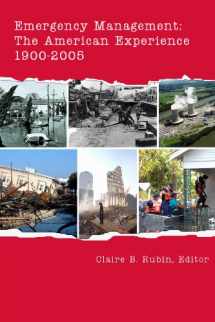
Emergency Management: The American Experience 1900-2005
Book details
Summary
Description
In autumn 2005, three massive hurricanes Katrina, Rita, and Wilma struck the U.S. with catastrophic results. Hurricane Katrina, in particular, stood out as one of the worst disasters of the past 100 years. The emergency response to Katrina was so inadequate and problematic that the U.S. was humiliated both at home and abroad. These events prompted perhaps the deepest and most sustained examination of public emergency management (EM) functions and systems ever conducted in U.S. history. Citizens, the media, and public officials have questioned the effectiveness of our emergency management systems. The three 2005 hurricanes did for natural disaster response what the terrorist attacks on 9/11 did for counter-terrorism--both glaringly displayed the weaknesses and failures in certain systems, processes, and leadership. Emergency Management: The American Experience, 1900-2005 brings a historical perspective to this ongoing examination. Edited by Claire B. Rubin, this book reviews the past century of historic major disasters in the U.S. and their outcomes, with a special focus on governmental response. Among the types of disasters included are earthquakes, hurricanes, droughts, floods, a pandemic, and an explosion. For 80 of the past 105 years, the federal government s role in emergency management has been expanding. With virtually every new presidential administration, the organizational forms and functions of EM have evolved. Changes have occurred not only within public management systems and services, but also with the expectations of state and local government officials and the general public. The book is intended to answer two key questions: Why did the federal government get involved in emergency management? Why and how has that role changed? Not a traditional history book, Emergency Management: The American Experience, 1900-2005 provides a unique analytic approach, focusing on the changes in public policies, administration, and organizations resulting from major focusing disaster events. It is an excellent textbook or supplemental textbook for college courses that focus on emergency management.


We would LOVE it if you could help us and other readers by reviewing the book
Book review



